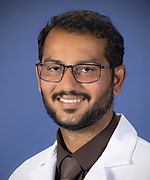Molecular Diagnostics Rotation - 1 month
The molecular pathology rotation introduces the resident to the analysis of nucleic acid in diagnostic methodologies, including those concerning detection of chromosomal translocation in tumors, microbial diagnosis, viral burden, hereditary genetic disorders, mutation detection, and oncogene amplification. The resident will be introduced to a variety of technologies, including polymerase chain reaction (PCR), reverse transcription PCR, quantitative real-time PCR (TaqMan PCR), fluorescence melting curve analysis, gel electrophoresis, restriction enzyme digestion, probe hybridization, fluorescence in situ hybridization (FISH) and Next Generation Sequencing.
During the course of the four-year training and month rotation, residents will be exposed to a lecture series and discussions with faculty that describe:
- Basic concepts of molecular biology: genetic encoding, transcription, translation, imprinting and basic features of RNA and DNA.
- Concepts of hybridization such as differences in DNA: DNA, DNA: RNA, and RNA: RNA hybrids, basic principles of gel electrophoresis, stringency and restriction digestion.
- Methods utilized in molecular pathology, including polymerase chain reaction, restriction enzyme digestion, DNA fingerprinting, in situ hybridization, fluorescence in situ hybridization (FISH), TaqMan PCR, transcription mediated amplification, Northern, Southern and Western blot analysis and hybrid capture.
- Molecular testing of infectious diseases, inherited diseases, solid tumors and hematological disorders.
- Future targets for clinically relevant testing, including genomics, proteomics, microarrays, non-invasive prenatal testing, and next generation sequencing.
- A Genomics and Personalized Medicine Lecture Series of 18 lectures that introduce the residents to emerging technologies, personalized medicine, and the application of array and sequence based technologies.
Rotation Objective
- Understand basic concepts of molecular biology and human genetics.
- Become familiar with the theory, performance and clinical interpretation of molecular assays in all four major areas of molecular pathology: infectious diseases, inherited diseases, solid tumors and hematological disorders.
- Understand specimen requirements for molecular tests.
- Understand clinical applications of molecular testing and its relation to other methodologies.
- Develop familiarity with basic administrative, technical, safety and quality control issues important for the operation of the molecular diagnostic lab.
Overall Responsibilities
- The resident will participate in the interpretation of the molecular tests and in issuing the respective molecular diagnostic reports.
- The resident will participate in molecular pathology laboratory meetings.
- The resident will participate in the interpretation of the molecular tests and in issuing the respective molecular diagnostic reports.
- The resident will be given topics to research and present several days per week.
- The resident will be required to isolate DNA, analyze it for quantity and purity, perform a molecular test on the sample, and interpret the results.
- The resident will research an assigned topic and present the clinical and technical aspects of as it relates to medical practice. A 30 minute presentation will be given to the Molecular Diagnostic Laboratory staff.
Daily Responsibilities
The resident will be provided with reading assignments on the basic principles of molecular biology and diagnostic molecular pathology. The resident will meet several days per week with the director and faculty of the rotation for discussion and review of the assigned literature, interpretation of molecular tests and relevance of test results to clinical practice. The resident will rotate through the molecular benches and observe molecular assays in three major areas of molecular pathology:
- Molecular diagnostics of infectious diseases: quantitative, qualitative and genotype testing for viral targets (HPV, HSV, EBV, CMV, RVP, HIV, HCV, HBV and BK) and qualitative testing for bacteria (chlamydia/GC).
- Molecular diagnostics of leukemia and solid tumors: t(9;22) bcr-abl, t(15;17), mutation detection technologies for k-ras, EGFR; FISH for erbB2, Alk, 1p19q and Next Generation technologies for targeted sequencing and exome sequencing).
- Molecular diagnostics of genetic and inherited disorders, including molecular detection of coagulation diseases.
Evaluation
The resident will be evaluated through daily interaction with the faculty. At the end of rotation, the resident will also be evaluated by the quality of their final presentation.

 Meet our Residency Program Director
Meet our Residency Program Director
